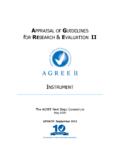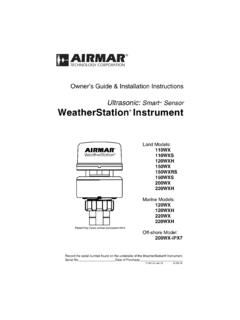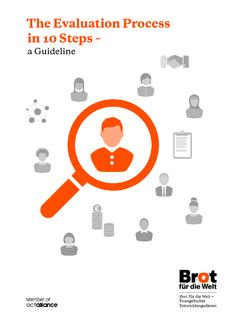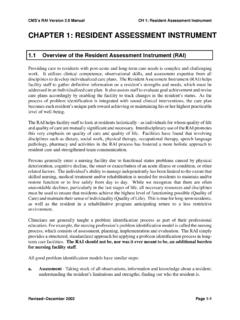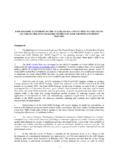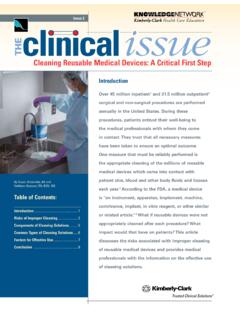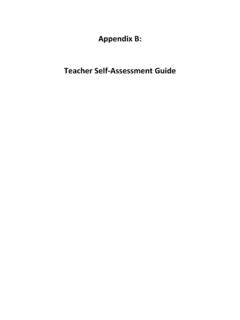Transcription of Technological Pedagogical Content Knowledge (TPACK): The ...
1 Journal of Research on Technology in Education 123 Copyright 2009, ISTE (International Society for Technology in Education), ( & Canada) or (Int l), All rights Pedagogical Content Knowledge (TPACK): The Development and Validation of an Assessment Instrument for Preservice TeachersDenise A. SchmidtEvrim BaranAnn D. ThompsonIowa State UniversityPunya MishraMatthew J. KoehlerTae S. ShinMichigan State UniversityAbstractBased in Shulman s idea of Pedagogical Content Knowledge , Technological Pedagogical Content Knowledge (TPACK) has emerged as a useful frame for describing and understanding the goals for technology use in preservice teacher education. This paper addresses the need for a survey instrument designed to assess TPACK for preservice teachers.
2 The paper describes survey development process and results from a pilot study on 124 preservice teachers. Data analysis procedures included Cronbach s alpha statistics on the TPACK Knowledge domains and factor analysis for each domain. Results suggest that, with the modification and/or deletion of 18 of the survey items, the survey is a reliable and valid instrument that will help educators design longitudinal studies to assess preservice teach-ers development of TPACK. (Keywords: TPACK, instrument development, preservice teachers)The purpose of this study was to develop and validate an instrument designed to measure preservice teachers self-assessment of their Technological Pedagogi-cal Content Knowledge (TPACK) and related Knowledge domains included in the framework.
3 TPACK is a term used increasingly to describe what teachers need to know to effectively integrate technology into their teaching practices. In this article, we detail the steps used to develop and validate an instrument to measure preservice teachers development of TPACK. TheoreTICAl FrAmeworKTechnological Pedagogical Content Knowledge (TPCK) was introduced to the educational research field as a theoretical framework for understanding teacher Knowledge required for effective technology integration (Mishra & Koe-hler, 2006). The TPCK framework acronym was renamed TPACK (pronounced tee-pack ) for the purpose of making it easier to remember and to form a more integrated whole for the three kinds of Knowledge addressed: technology, peda-gogy, and Content (Thompson & Mishra, 2007 2008).
4 The TPACK framework builds on Shulman s construct of Pedagogical Content Knowledge (PCK) to JRTE, 42(2), 123 149124 Winter 2009 10: Volume 42 Number 2 Copyright 2009, ISTE (International Society for Technology in Education), ( & Canada) or (Int l), All rights technology Knowledge as situated within Content and Pedagogical the term is new, the idea of TPACK has been around for a while. A precursor to the TPCK idea was a brief mention of the triad of Content , theory (as opposed to pedagogy), and technology in Mishra (1998), though within the context of educational software design. Pierson (1999, 2001), Keating and Evans (2001), and Zhao (2003) similarly describe the relationships between technology, Content , and pedagogy.
5 Other researchers have addressed similar ideas, though often under different labeling schemes, including integration lit-eracy (Gunter & Bumbach, 2004); information and communication (ICT)-re-lated PCK ( , Angeli & Valanides, 2005); Technological Content Knowledge (Slough & Connell, 2006); and electronic PCK or e-PCK ( , Franklin, 2004; Irving, 2006). Others who have demonstrated a sensitivity to the relationships between Content , pedagogy, and technology include Hughes (2004); McCrory (2004); Margerum-Leys and Marx (2002); Niess (2005); and Slough & Con-nell (2006).TPACK is a framework that introduces the relationships and the complexities between all three basic components of Knowledge (technology, pedagogy, and Figure 1: The components of the TPACK framework (graphic from ).)
6 Journal of Research on Technology in Education 125 Copyright 2009, ISTE (International Society for Technology in Education), ( & Canada) or (Int l), All rights ) (Koehler & Mishra, 2008; Mishra & Koehler, 2006). At the intersec-tion of these three Knowledge types is an intuitive understanding of teaching Content with appropriate Pedagogical methods and technologies. Seven compo-nents (see Figure 1) are included in the TPACK framework. They are defined as:Technology Knowledge (TK): 1. Technology Knowledge refers to the knowl-edge about various technologies, ranging from low-tech technologies such as pencil and paper to digital technologies such as the Internet, digital video, interactive whiteboards, and software Knowledge (CK):2.
7 Content Knowledge is the Knowledge about actual subject matter that is to be learned or taught (Mishra & Koehler, 2006, p. 1026). Teachers must know about the Content they are going to teach and how the nature of Knowledge is different for various Content Knowledge (PK):3. Pedagogical Knowledge refers to the methods and processes of teaching and includes Knowledge in classroom management, assessment, lesson plan development, and student Content Knowledge (PCK):4. Pedagogical Content Knowledge refers to the Content Knowledge that deals with the teaching process (Shulman, 1986). Pedagogical Content Knowledge is different for various Content areas, as it blends both Content and pedagogy with the goal being to develop better teaching practices in the Content Content Knowledge (TCK):5.
8 Technological Content knowl-edge refers to the Knowledge of how technology can create new represen-tations for specific Content . It suggests that teachers understand that, by using a specific technology, they can change the way learners practice and understand concepts in a specific Content Pedagogical Knowledge (TPK): 6. Technological pedagogi-cal Knowledge refers to the Knowledge of how various technologies can be used in teaching, and to understanding that using technology may change the way teachers teach. Technological Pedagogical Content Knowledge (TPACK):7. Technological Pedagogical Content Knowledge refers to the Knowledge required by teach-ers for integrating technology into their teaching in any Content area.
9 Teachers have an intuitive understanding of the complex interplay be-tween the three basic components of Knowledge (CK, PK, TK) by teach-ing Content using appropriate Pedagogical methods and framework focuses on designing and evaluating teacher Knowledge that is concentrated on effective student learning in various Content areas (AACTE Committee on Innovation and Technology, 2008). Thus, TPACK is a use-ful frame for thinking about what Knowledge teachers must have to integrate technology into teaching and how they might develop this Knowledge . Using TPACK as a framework for measuring teaching Knowledge could potentially have an impact on the type of training and professional development experi-ences that are designed for both preservice and inservice teachers.
10 Hence, there 126 Winter 2009 10: Volume 42 Number 2 Copyright 2009, ISTE (International Society for Technology in Education), ( & Canada) or (Int l), All rights a continual need to rethink our preparation practices in the teacher educa-tion field and propose new strategies that better prepare teachers to effectively integrate technology into their educators have expressed enthusiasm for the TPACK frame for teacher Knowledge (Angeli & Valanides, 2009; Special Interest Group for Teacher Education [SIGTE] Leadership and National Technology Leadership Summit (NTLS) Program Committee, 2008; Wetzel, Foulger & Williams, 2008 2009), work is just beginning on assessing teachers understanding of TPACK. Researchers have noted the need to develop reliable assessment ap-proaches for measuring TPACK and its components to better understand which Table 1.










